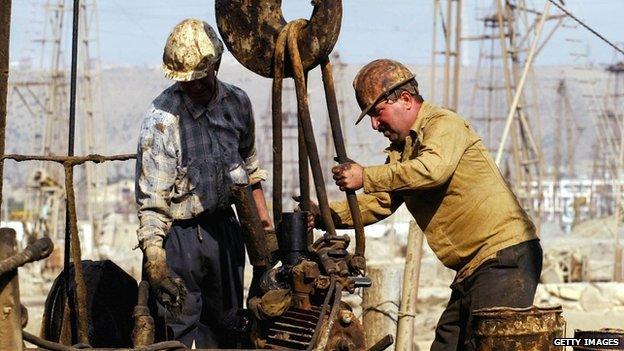Are low oil prices here to stay?
- Published

A review of the best commentary on and around the world...
Today's must-read
Americans have become used to the bouncing cost of oil over recent years. Prices have spiked, causing angst and political posturing ("Drill, baby, drill" and all), and they've tanked following the economic upheaval of the Great Recession and the 9/11 attacks.
The bottom has again dropped out of the oil market, as the cost per barrel has declined more than 40% since June. The change has been a welcome relief for consumers and energy-intensive industries, for which the change is an unexpected financial windfall.
While most have a nagging suspicion that the drop is only temporary and prices will, at some point soon, begin an upward climb, Bloomberg View's Mohamed A El-Erian isn't so sure, external.
What the world is currently experiencing is a "fundamental shift" in the supply model, he says, that "will likely have long-lasting effects".
The primary reason, he says, is that Saudi Arabia is no longer willing to cut its oil production to support higher prices. The Saudis have lost market share when they've done this in the past, and they aren't willing to make that sacrifice this time, particularly with non-traditional sources of production, like US shale fields, coming into play.
Without Saudi action artificially limiting supply, El-Erian continues, market forces will have to exert their slow influence before prices start rising again.
"Low prices will lead to the gradual shutdown of what are now unprofitable oil fields and alternative energy supplies, and they will discourage investment in new capacity," he writes. "At the same time, they will encourage higher demand for oil."
This won't happen overnight, he says, and in the meantime oil-importing nations will see their economies boosted, and oil exporters like Russia, Venezuela, Iraq and Nigeria will suffer. The result will be a shakeup in the geopolitical world order "that, not so long ago, would have been considered remote, if not unthinkable".
While El-Erian declines to pass judgement on whether these changes will be good or bad, others are happy to weigh in.
Pascal-Emmanuel Gobry, writing in the Week, says, external the oil price drop can be credited to conservative energy policies. The free market and American entrepreneurialism led to the development of "inventive solutions" like the fracking technology that allowed access to US shale oil.
"The American system, by the way, is not some Ayn Rand fantasy: there is a role for government, not just in providing the rule of law and a common framework for doing business, but also in subsidising basic research," he writes. "But that role is very different from the role that progressives would wish the government to play, stymying private enterprise through over-regulation and central planning."
Incoming Natural Resources Defense Council president Rhea Suh takes a considerably less sanguine view, arguing, external that the oil price drop will be bad for environmental conservation and mask the long-term costs of fossil fuels.
"Oil prices go up, down and up again, depending on global forces. What it means is that our families, our workers, our entire economy is held hostage to global price swings we can neither control nor predict," he writes in the Los Angeles Times.
If US consumers are hostages, they seem to be happy ones. Many are returning to old energy-using habits, report, external the Wall Street Journal's Josh Mitchell and Amy Harder. Average fuel economy for vehicles sold in the US dipped in September for the first time in seven years.
Petrol-guzzling sport-utility vehicles and trucks comprised 52% of all auto sales in October, up from 4% a year earlier and 44% in 2008. Electric vehicle sales are down, and train ridership could follow.
"The developments highlight the difficulty of designing long-term policies around volatile crude-oil and gasoline prices," they write. "They also point to a long-standing reality in American energy policy: Even before the latest price drop, gasoline has long been far cheaper than in advanced economies in Europe and Asia, making it tough to promote alternatives."
The sudden drop in oil prices caught many forecasters and policymakers by surprise. Will they be any better at predicting the consequences if low-cost energy is here to stay?
Iran
The real hacking threat, external - While much of the Western media was obsessing over whether the North Koreans were behind the cyber-attack on Sony Pictures, writes American Foreign Policy Council vice-president Ilan Berman, a larger threat was being ignored.
"Over the past two years, a number of significant cyber incidents have been tied to Iran in one way or another," he writes.
Iranians have targeted companies in the US, Canada, France, Kuwait, Qatar, Turkey, Pakistan and South Korea, among other nations, he writes.
Although there has been a drop in attacks recently, he says, a breakdown in nuclear negotiations between Iran and the West could make cyber-war "a distinct possibility".
Sweden
Suicide by immigration?, external - The Swedish government is stifling debate over whether welcoming a large number of immigrants from nations like Somalia, Iraq and Syria threatens "Swedish culture", says Middle East Forum president Daniel Pipes.
"The realities of immigration are apparent for all to see: welfare dependency, violent bigotry against Christians and Jews, and a wide range of social pathologies from unemployment to politically motivated rape," he writes in the National Review.
While the Swedish public is becoming increasingly doubtful about annual immigration numbers equivalent to 1% of Sweden's existing population, political parties on the left and right consider an open debate taboo, he says.
The only exception are the Sweden Democrats, which could see a boost in the next round of elections - perhaps, Pipes concludes, finally prompting a real debate over "the supreme issue of national suicide".
Colombia
Gustavo Petro's Colombian ascent, external - Bogota Mayor Gustavo Petro, a former Marxist guerrilla, could be "a visionary with a disdain for the humdrum of public politics" or the next Latin American strongman, writes El Espectador's Cristina de La Torre (translated by WorldCrunch).
Mr Petro once "presented himself as an alternative to the political armies of right and left, one lot defending its extremist policies against the other's rigid socialism," she writes. But he alienated supporters and was ousted as mayor by his conservative nemesis.
Now he's been re-elected, after campaigning as a supporter of the oppressed.
"His affirmative, headstrong brand of socialism is seductive to those who feel left out," she writes. "But it also serves to fuel the right's strident opposition."
China
A death penalty activist, external - Kong Ning witnessed the execution of 34 Chinese prisoners as a young government official, and she has now become an outspoken critic of her nation's capital punishment programme.
She is not alone, writes Lijia Zhang in the New York Times, as a growing anti-death penalty movement is taking hold in China.
"More and more people, particularly those who are better educated, have accepted the concept of respecting human life, human dignity and human rights, even the rights of a criminal," she says.
Although there are no public records, indications are that the number of executions in China is on the decline, and fewer crimes are eligible for the death penalty. It may be happening slowly, she concludes, but "the public and authorities are coming around".
BBC Monitoring's quotes of the day
Russian commentators offer their take on the events of the past year.
"Out of the entire Asian experience our authorities are picking out the worst features - that is the absence of democracy, irremovability of the authorities and justice dependant on the sovereign ruler." - Konstantin Remchukov in Nezavisimaya Gazeta , external.
"The return of Crimea, and the coup and civil war in Ukraine supported by the US and countries of the European Union became a starting point for instigating a new Cold War." - Article in Nezavisimaya Gazeta, external.
"In Russia the year 2014 has become 'the Year of the Great Turn': the stability of the 2000s is over... People have a feeling of being on a geopolitical stadium, where Russia (after a 25-year-long break) left the substitutes' bench and is playing. Against the USA!" - Leonid Radzikhovskiy in Rossiyskaya Gazeta, external.
Have you found an interesting opinion piece about global issues that we missed? Share it with us via email at echochambers (at) bbc.co.uk.
- Published1 October 2014

- Published16 October 2014
